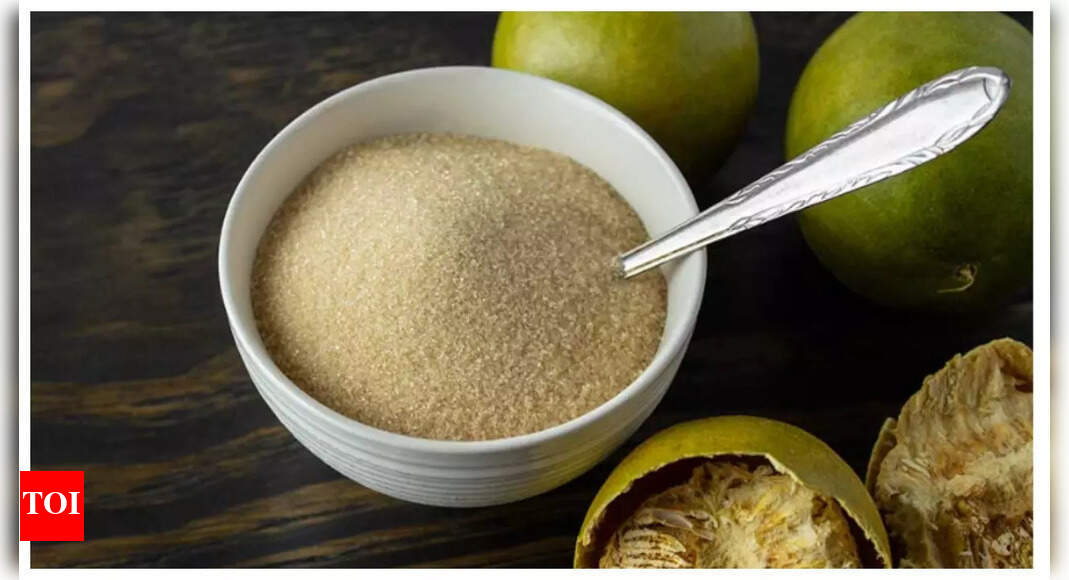
Most people view monk fruit sugar as an organic, risk-free and beneficial sugar substitute. The monk fruit, which grows as a small Chinese green melon, produces mogrosides that function as sweet compounds outperforming sugar in sweetness, but contain no calories. Because monk fruit sugar originates from nature and does not spike blood sugar, it is considered a safe substitute to sugar. However, a majority of commercial monk fruit sweeteners combine erythritol with it, which research has revealed elevates heart risks, by increasing blood clotting which may result in heart attacks and strokes. Let’s take a closer look at the connection…

What is Monk Fruit sugarThe process of mogrosides extraction from monk fruit yields natural sweetener monk fruit sugar. Monk fruit sugar contains 150 to 250 times more sweetness than sugar, without causing blood sugar or insulin level changes. The product serves as a favorite choice for diabetic patients, and people who wish to cut down their sugar consumption. The U.S. Food and Drug Administration (FDA) has classified monk fruit extract as “Generally Recognized as Safe” (GRAS), indicating it is safe for use in foods. Monk fruit exhibits minimal adverse effects according to scientific research, making it a safe natural sweetener that could help people control blood sugar levels and lose weight.The hidden dangerThe majority of monk fruit sweeteners available in the market contain erythritol as a bulking agent, which also enhances the product’s texture. Erythritol stands out in the food industry because it has low caloric value, while causing minimal changes to blood sugar levels. Countless “sugar-free”, “keto-friendly” and “low-carb” products contain this ingredient.Modern scientific research indicates that erythritol presents multiple health risks to the cardiovascular system. Research shows that erythritol creates conditions which promote platelet adhesion, because it enhances their sensitivity to aggregation signals that lead to heart attacks and strokes. Research conducted at Nature Medicine established that people who consumed the most erythritol, experienced a doubling of major adverse cardiovascular events (MACE) including heart attacks and strokes, compared to individuals who consumed the least amount.The impact of erythritolResearchers have discovered that human platelets became more responsive to blood clotting signals, after being exposed to erythritol. Studies with animals demonstrated that high erythritol levels both sped up blood clotting processes, and produced arterial blockages. The erythritol content in beverages consumed by healthy volunteers produced high blood erythritol concentrations that persisted for multiple days, thus increasing their risk of developing blood clots.Erythritol presents a significant concern for people who have diabetes or metabolic syndrome, since these conditions already put them at risk for heart disease.Brain and blood vessel concernsResearch indicates that erythritol creates damage to both blood vessels, and brain tissue. The exposure of erythritol to human brain blood vessel cells, led to higher oxidative stress levels, together with decreased nitric oxide production in research findings. Blood vessels require nitric oxide to relax, while it helps maintain proper circulation. When nitric oxide levels decrease, it causes blood vessel constriction, which leads to increased chances of ischemic stroke, together with vascular complications.The creation of oxidative stress leads to brain cell injuries, which may create neurovascular problems. Research indicates that erythritol produces detrimental impacts, which reach from the cardiovascular system into brain health domains.What studies say about monk fruitOn the other hand, monk fruit extract produces no adverse health effects because it remains mostly risk-free. On the contrary, Monk fruit extract research indicates its potential to reduce blood sugar and insulin levels, thus benefiting individuals with type 2 diabetes. Research involving animals demonstrated that monk fruit extract enhanced blood sugar management, while producing no cardiovascular side effects that erythritol generated. The restricted human research indicates promise while monk fruit has traditionally served as an Asian food sweetener for centuries.How to select your sweetenerPeople need to inspect labels carefully, because erythritol appears frequently in monk fruit sweetener products. Monk fruit extract that contains no erythritol, exists in limited supply, and offers superior safety benefits to people with cardiovascular health concerns.

Here are some tips:Check ingredient labels carefully to steer clear of both erythritol and sugar alcohol additives.Select pure monk fruit extract or monk fruit powder products that do not contain any additives.Monk fruit extract should be consumed in limited quantities as a part of a healthful eating pattern.Consult with a doctor if you have heart disease risk factors before using sweeteners containing erythritol.ReferencesNIH, “Erythritol and cardiovascular events,” Nature Medicine, February 27, 2023.CNN Health, “Erythritol, an ingredient in stevia, linked to heart attack and stroke,” February 27, 2023.Medical News Today, “Just 1 erythritol-sweetened drink may harm brain, blood vessel health,” July 14, 2025.Healthline, “Monk Fruit Sweetener: Good or Bad?” June 13, 2019.Nature Medicine, “The artificial sweetener erythritol and cardiovascular event risk,” February 26, 2023.Science Daily, “Popular Sugar Substitute Linked to Brain Cell Damage,” July 19, 2025.WebMD, “Erythritol: Uses, Benefits, and Risks,” 2018.Health.com, “Monk Fruit: 4 Benefits, Nutrition, and Risks,” May 14, 2023.Disclaimer: This article is informational only and not a substitute for medical advice








